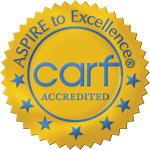Here at the Stepworks Connect blog, we talk a lot about why it’s a good idea to seek treatment if you’re struggling with a dependency on drugs or alcohol. Contacting a treatment program for admission can be a life-changing decision and a milestone in your life. So what’s next? Addiction treatment programs are made to guide personal change and growth. That means the results of going into addiction treatment depend greatly on how you approach it and how you navigate the program during your stay there. In other words, your mindset, attitude, and expectations can contribute to your treatment success! Can you think of ways to start getting into a recovery mindset to make the most out of treatment?
Similarly, if you have encouraged a loved one to seek treatment, you can continue to support them. One way to do that is by motivating them to have a positive and realistic view of their expectations and commitment to treatment.
Whether it’s you or your loved one who is preparing to enter an addiction treatment program, consider these aspects of getting into a good recovery mindset!
Get into an “all-in” recovery mindset
How can you prepare to get the most out of addiction treatment? Put the most into it! If you’re “all in” for recovery, that means you’re prepared to make treatment the central focus of your thought and action. It means you’re committed to making real changes, even if that means confronting thoughts or behaviors that seem difficult to change. The truth is, no matter how locked into addictive thinking and compulsive behavior you feel, we can change our thinking and behavior.
Tell your ego to take a backseat
Some people have trouble in residential rehab programs because they’re not used to following directions from others. Getting into arguments with staff or other people in the program is a common cause of leaving treatment prematurely. It’s important to remember that you’re not going into a treatment setting in order to impose your feelings and desires on other people. Instead, you’re there to take stock of the ways in which your thoughts and feelings are creating problems in your life by playing into a substance dependency.
Prepare to put your ego in check by understanding the importance of following the rules and directions that your treatment program has in place. They’re there to help you—not by turning you into someone who blindly follows orders, but by helping you put in place some structure in your habits and thoughts. Remember that you’re learning practices that you will need to use independently after you get out of treatment.
Prepare your recovery mindset for ups and downs
Life in a treatment program can be a bit of an emotional roller coaster. It’s normal to have good days and bad days, days you feel ready to take on the world and days you feel it’s too hard to change. Prepare yourself to take these internal swings in stride by acknowledging that they’re normal and completely understandable. Try to take a middle road by not placing too much stock in extreme optimism or extreme pessimism.
If you wake up feeling like you have your addiction kicked and you could leave the program today, recenter your thoughts by acknowledging you still have some things to learn. If you find yourself feeling hopeless or extremely negative, remind yourself that anyone who puts in the work can make real changes.
Another useful way of combating negative thoughts while you’re in treatment is to remind yourself of why you’re there. Do some thinking before your admission day about the most important reasons you’re going into treatment. Is it to be a strong source of support for loved ones who depend on you? Is it to start a journey to a particular life goal? You’ll be confronting some difficult emotions while in treatment. It’s important to have these goals to draw on in moments of negative or pessimistic feelings.
Focus on YOU…
It can be hard to leave loved ones behind for even a short stay in treatment program. When we’re feeling vulnerable, it’s normal to want our closest friends or family members there by our side. But too often this becomes a barrier to getting the most out of treatment. Being overly concerned with being apart from loved ones while you are in treatment means you are not really focused on making the personal commitment required for recovery.
The truth is, your family and friends will be waiting for you when you graduate from your treatment program. And you’ll be better prepared to have a healthy relationship with them.
For those who have encouraged a loved one to seek treatment, it can be helpful to reassure your loved one that they don’t need to worry about obligations to friends and family while they are in treatment. Let them know that they are supported in their recovery, and that their loved ones are willing to pull a little extra weight while they’re away. If you’re able to, try to help out in practical ways by volunteering to cover some responsibilities they feel need to be met (within reason, of course).
…But take advantage of the social aspects of treatment
Although you’ll be focusing on personal issues having to do with your own thoughts and behaviors, that doesn’t mean treatment is about isolating yourself from social interactions. Residential treatment programs have the benefit of placing yourself in a social setting that is all about recovering from addiction. Take this opportunity to make allies in recovery from substance dependency.
In practical terms, that means being open about sharing your experiences with the others in your groups. It also means listening to the experiences that they share. Everyone there will be on a unique path from addiction to recovery, but there will also be many points of shared experience and growth through social learning. Don’t be afraid to connect with others in the program, while at the same time respecting the interpersonal boundaries your treatment program sets. You’ll find that recovery is easier when it’s a shared journey with others who you acknowledge and respect.
These tips are by no means exhaustive, and it’s a good idea to do your own self-reflection before entering an addiction treatment program. Think about how you can shape a recovery mindset that will make your treatment experience a productive one. And remember that a new way of living is within reach!
Did you find this article useful? Get more by subscribing to the Stepworks Connect newsletter!
Stepworks Connect Newsletter



